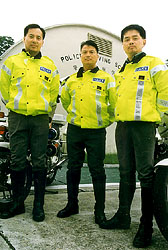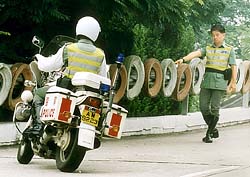



















| |
|
HONG KONG POLICE Driving School motorcycle
training instructors Sergeant Elton Wong Lap-yee and Sergeant Raymond Leung Sek-kau recently
returned from the UK where they successfully completed the Advanced Motorcycle training course
run by the Staffordshire Police, whose motor and motorcycling training school is known world-wide
for its excellence and has trained police officers from many different countries.
Not unlike many other Forces around the world, Hong Kong Police are heavily reliant on motorcycle patrol officers, whether they are traffic or district personnel. Traffic congestion (especially during rush hours) facilitates motorcycle officers who can get around much more easily. But getting around "easily" and manoeuvring through Hong Kong's labyrinth of congested streets and tight corners in often inclement weather on a Honda 750cc (the workhorse of the Force) is by no means "easy". "The sheer weight of a 750 is enormous. It's not stable like a car, and on a motorcycle riders are totally exposed and in great danger if involved in accidents," says Sergeant Wong. "That's why we have endeavoured to improve the basic training that we give to our motorcycle officers and try to integrate locally obtained knowledge with what is done overseas," said Superintendent Robin Jolly who runs the Hong Kong Police Driving School. "That's also why two of our training instructors, Sergeants Wong and Leung were sent to the UK to go on the advanced course. What they have brought back will add to our training programme, improve our instructional skills and ultimately our trainees. That's what our training programme is all about - in a controlled environment we teach people what can happen and how to avoid it." It seems to be working. In the Hong Kong Police Force in that last three years motorcycle accidents have gone down significantly. That's a testimony to the improvements to motorcycle training that's been done at the Driving School, which has 22 established motorcycle trainers. The Force has about 800 motorcycles, and there's a continuous requirement for police motorcyclists. |
 Sergeants Leung and Wong flank Station Sergeant Li in their sharp UK motorcycle jackets --- a gift from their gracious hosts
|
|
In 1995, there were 273 traffic accidents involving motorcycles, 199 of which the officers were at fault. The next year saw traffic accidents involving motorcycles fall to 221 (161 of which the officers were at fault), while in 1997 traffic accidents involving motorcycles fell to 176. Although final results aren't in as to how many of those accidents were the officers' fault, numbers so far indicate it will be a lower and similar downward percentage. However, as far as SP Jolly is concerned, one accident is too many. Some police forces may have lower statistics, but then the Hong Kong Police Driving School has a strict approach to its assessment of motorcycle accidents involving officers. "There's no question of the benefit of the doubt going to the officer - it does not," says Mr Jolly. "It goes against him." | |
 Making use of advanced training learned in the UK, Sergeant Wong puts a Hong Kong Police Driving School trainee through his paces
|
This rather ruthless approach serves to help ensure that Hong Kong Police motorcyclists ride defensively at all times - which is what the Advanced Motorcycle training course run by the Staffordshire Police is all about. "One of the greatest skills that exists with great drivers is anticipation - looking and projecting ahead. Being prepared for what other drivers are going to do," says Sergeant Leung. "Defensive driving is a skill. The advanced course we took with the Staffordshire Police didn't teach us the technical aspects of the basic course. Rather it's more about anticipation and avoiding problems through anticipation, rather than getting yourself into an accident situation - which is how we instruct our motorcycle officers here." Says Station Sergeant acting Inspector Li Tat-keung, who took the advanced course given by the Staffordshire Police in1995, and is also a motorcycle training instructor at the Police Driving School: "The UK advanced motorcycle training course gave us much better exposure to anticipating what's likely to happen in many more real situations than can be practically experienced in Hong Kong. The road network in the UK is more varied and larger than Hong Kong with a myriad of road conditions from urban to rural environments: city streets, motorways, country roads, hilly terrain, long distances and off road areas - offering opportunity for a lot of motorcycle skills and stamina training." |
|
These officers also had the opportunity do a lot of advanced training at high speeds well in excess of the Hong Kong's legal limit, 100 km/h. "In Hong Kong, we're not allowed to train at speeds that break the speed limit. We can develop officers' motorcycle riding skills in the range of up to 100 km/h by training on our expressways - but that's the limit," said Sergeant Wong. "Of course CP's orders on high-speed pursuit are clear," explains SP Jolly. "High-speed pursuit is a no-win situation. Reckless speeds can lead to accidents to officers on motorbikes, to drivers being pursued, to other motorists or pedestrians. However, it's very important that our officers become confident in driving their motorcycles and in their ability to ride and control those machines in all conditions - and at varying speeds. The better the skill, the better the confidence, the better the policing - the fewer the accidents." | |

![]()
